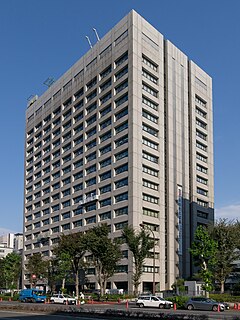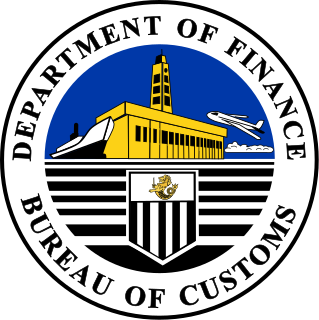
The Government Communications Headquarters (GCHQ) is an intelligence and security organisation responsible for providing signals intelligence (SIGINT) and information assurance to the government and armed forces of the United Kingdom. Based in "The Doughnut" in the suburbs of Cheltenham, GCHQ is the responsibility of the country's Secretary of State for Foreign and Commonwealth Affairs, but it is not a part of the Foreign Office and its director ranks as a Permanent Secretary.

The Board of Trade is a British government department concerned with commerce and industry, currently within the Department for International Trade. Its full title is The Lords of the Committee of the Privy Council appointed for the consideration of all matters relating to Trade and Foreign Plantations, but is commonly known as the Board of Trade, and formerly known as the Lords of Trade and Plantations or Lords of Trade, and it has been a committee of the Privy Council of the United Kingdom. The Board has gone through several evolutions, beginning with extensive involvement in colonial matters in the 17th Century, to powerful regulatory functions in the Victorian Era, to virtually being dormant in the last third of 20th century. In 2017, it was revitalized as an advisory board headed by the International Trade Secretary who has nominally held the title of President of the Board of Trade, and who at present is the only privy counsellor of the Board, the other members of the present Board filling roles as advisers.
International Traffic in Arms Regulations (ITAR) is a United States regulatory regime to restrict and control the export of defense and military related technologies to safeguard U.S. national security and further U.S. foreign policy objectives.

Her Majesty's Revenue and Customs is a non-ministerial department of the UK Government responsible for the collection of taxes, the payment of some forms of state support and the administration of other regulatory regimes including the national minimum wage.

The Customs and Excise Department (C&ED) is a government agency responsible for the protection of the Hong Kong Special Administrative Region against smuggling; the protection and collection of revenue on dutiable goods on behalf of the Hong Kong Government; the detection and deterrence of drug trafficking and abuse of controlled drugs; the protection of intellectual property rights; the protection of consumer interests; and the protection and facilitation of legitimate trade and upholding Hong Kong's trading integrity.

The Customs Service is a state sector organisation of New Zealand whose role is to provide border control and protect the community from potential risks arising from international trade and travel, as well as collecting duties and taxes on imports to the country.
The Australian Intelligence Community (AIC) and the National Intelligence Community (NIC) or National Security Community of the Australian Government are the collectives of statutory intelligence agencies, policy departments, and other government agencies concerned with protecting and advancing the national security and national interests of the Commonwealth of Australia. The intelligence and security agencies of the Australian Government have evolved since the Second World War and the Cold War and saw transformation and expansion during the Global War on Terrorism in response to current international and domestic security issues such as terrorism, violent extremism, cybersecurity, transnational crime, counter-proliferation, support to military operations, and Pacific regional instability.

The Arms Export Control Act of 1976 gives the President of the United States the authority to control the import and export of defense articles and defense services. The H.R. 13680 legislation was passed by the 94th Congressional session and enacted into law by the 38th President of the United States Gerald R. Ford on June 30, 1976.

The Department of the Prime Minister and Cabinet (DPMC) is the central public service department of New Zealand charged with providing support and advice to the Governor-General, the Prime Minister and members of the Cabinet of New Zealand. The department is also charged with centrally leading New Zealand's "national security planning, which includes civil defence."

The Ministry of Economy, Trade and Industry or METI, is a ministry of the Government of Japan. It was created by the 2001 Central Government Reform when the Ministry of International Trade and Industry merged with agencies from other ministries related to economic activities, such as the Economic Planning Agency.
The counter-terrorism page primarily deals with special police or military organizations that carry out arrest or direct combat with terrorists. This page deals with the other aspects of counter-terrorism:
In the United Kingdom there were direct sales to both sides in the Iran–Iraq War. With an embargo in effect various companies also supplied Iraq and Iran by shipping materials through third-party countries and from those countries to the belligerents. While some of this exporting was legal, permitted or tolerated by parliament, Iraqi clandestine procurement operations were especially active in Britain.

An executive agency is a part of a government department that is treated as managerially and budgetarily separate, to carry out some part of the executive functions of the United Kingdom government, Scottish Government, Welsh Government or Northern Ireland Executive. Executive agencies are "machinery of government" devices distinct both from non-ministerial government departments and non-departmental public bodies, each of which enjoy a real legal and constitutional separation from ministerial control. The model was also applied in several other countries.
The New Year Honours 1996 were appointments by most of the sixteen Commonwealth realms of Queen Elizabeth II to various orders and honours to reward and highlight good works by citizens of those countries, and honorary ones to citizens of other countries. They were announced on 29–30 December 1995 to celebrate the year passed and mark the beginning of 1996 in the United Kingdom, New Zealand and the Cook Islands, The Bahamas, Grenada, Papua New Guinea, the Solomon Islands, Tuvalu, Saint Vincent and the Grenadines, Belize, and Antigua and Barbuda.
The New Year Honours 1995 were appointments by most of the sixteen Commonwealth realms of Queen Elizabeth II to various orders and honours to reward and highlight good works by citizens of those countries, and honorary ones to citizens of other countries. They were announced on 31 December 1994 to celebrate the year passed and mark the beginning of 1995 in the United Kingdom, New Zealand and Cook Islands, the Bahamas, Grenada, Papua New Guinea, the Solomon Islands, Tuvalu, Saint Vincent and the Grenadines, and Belize.
The New Year Honours 1994 were appointments by most of the sixteen Commonwealth realms of Queen Elizabeth II to various orders and honours to reward and highlight good works by citizens of those countries, and honorary ones to citizens of other countries. They were announced on 31 December 1993 to celebrate the year passed and mark the beginning of 1994 in the United Kingdom, New Zealand, the Bahamas, Grenada, Papua New Guinea, the Solomon Islands, Saint Vincent and the Grenadines, Antigua and Barbuda, and Saint Christopher and Nevis.
The Queen's Birthday Honours 1995 were appointments by some of the 16 Commonwealth realms to various orders and honours to recognise and reward good works by citizens of those countries. The Birthday Honours are awarded as part of the Queen's Official Birthday celebrations during the month of June.
The Department of Commerce and Agriculture was an Australian government department that existed between December 1942 and January 1956.

The Bureau of Customs is a Philippine government agency under the Department of Finance.
















